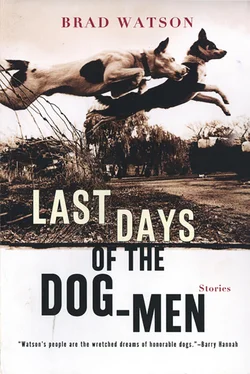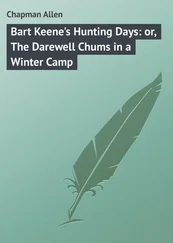Brad Watson
Last Days of the Dog-Men
For Jason, Owen, Bonnie,
and Jeanine
Thanks to Jon Hershey, Ric Dice, Stephanie Bobo, and Will Blythe, gentle critics and friends; to the Horns for October writing quarters; to Lois Rosenthal for support and assistance; and to my brother Craig and my late father, Robert Earl Watson, great storytellers. Special thanks to Alane Saliemo Mason, friend and editor, who made all the difference.
Ultimately, the dog, its constant presence in human experience coupled with its nearness to the feral world, is the alter ego of man himself.
— David Gordon White, Myths of the Dog-Man
WHEN I WAS A BOY MY FAMILY ALWAYS HAD HUNTING dogs, always bird dogs, once a couple of blueticks, and for six years anywhere from six to fifteen beagles. But we never really got to where we liked to eat rabbit, and we tired of the club politics of hunting deer, so we penned up the beagles, added two black Labs, and figured we’d do a little duck.
Those were raucous days around the house, the big pen in the back with the beagles squawling, up on their hind legs against the fence, making noises like someone was cutting their tails off. It was their way. At night when I crept out into the yard they fell silent, their white necks exposed to the moon, their soft round eyes upon me. They made small, disturbed, guttural sounds like chickens.
Neighbors finally sent the old man to municipal court charged with something like disturbing the peace, and since my mother swore that anyway she’d never fry another rabbit, they looked like little bloody babies once skinned, she said, he farmed out the beagles and spent his Saturdays visiting this dog or that, out to Uncle Spurgeon’s to see Jimbo, the best runner of the pack. Or out to Bud’s rambling shack, where Bud lived with old Patsy and Balls, the breeder. They hollered like nuclear warning sirens when the old man drove up in his Ford.
After that he went into decline. He liked the Labs but never took much interest, they being already a hollow race of dog, the official dog of the middle class. He let them lounge around the porch under the ceiling fan and lope around the yard and the neighborhood, aimless loafers, and took to watching war movies on TV in his room, wandering through the house speaking to us like we were neighbors to hail, engage in small talk, and bid farewell. He was a man who had literally abandoned the hunt. He was of the generation that had moved to the city. He was no longer a man who lived among dogs.
It wasn’t long after that I moved out anyway, and got married to live with Lois in a dogless suburban house, a quiet world that seemed unanchored somehow, half inhabited, pale and blank, as if it would one day dissolve to fog, lines blurring, and seep away into air, as indeed it would. We bought a telescope and spent some nights in the yard tracking the cold lights of the stars and planets, looking for patterns, never suspecting that here were the awful bloody secrets of the ancient human heart and that every generation must flesh them out anew. Humans are aware of very little, it seems to me, the artificial brainy side of life, the worries and bills and the mechanisms of jobs, the doltish psychologies we’ve placed over our lives like a stencil. A dog keeps his life simple and unadorned. He is who he is, and his only task is to assert this. If he. desires the company of another dog, or if he wishes to mate, things can get a little complex. But the ways of settling such things are established and do not change. And when they are settled and he is home from his wandering he may have a flickering moment, a sort of Pickett’s Charge across the synaptic field toward reflection. But the moment passes. And when it passes it leaves him with a vague disquietude, a clear nose that on a good night could smell the lingering presence of men on the moon, and the rest of the day ahead of him like a canyon.
WHICH IS HOW I’VE TRIED TO VIEW THE DAYS I’VE spent here in this old farmhouse where I’m staying with my friend Harold in the country. I’m on extended leave of absence from the Journal . But it’s no good. It’s impossible to bring that sort of order and clarity to a normal human life.
The farmhouse is a wreck floating on the edge of a big untended pasture where the only activities are the occasional squadron of flaring birds dropping from sight into the tall grass, and the creation of random geometric paths the nose-down dogs make tracking the birds. The back porch has a grand view of the field, and when weather permits we sit on the porch and smoke cigarettes and sip coffee in the mornings, beer in the afternoons, often good scotch at night. At midday, there’s horseshoes.
There’s also Phelan Holt, a mastiff of a man, whom Harold met at the Blind Horse Bar and Grill and allowed to rent a room in the house’s far corner. We don’t see a great deal of Phelan, who came down here from Ohio to teach poetry at the women’s college. He once played linebacker for a small college in the Midwest, and then took his violent imagination to the page and published a book of poems about the big subjects: God, creation, the confusion of the animals, and the bloody concoction of love. He pads along a shiny path he’s made through the dust to the kitchen for food and drink, and then pads back, and occasionally comes out to the porch to drink bourbon and to give us brief, elliptical lectures on the likes of Isaac Babel, Rilke, and Cervantes, gently smoking a joint which he does not share. In spite of his erudition, thick, balding Phelan is very much a moody old dog. He lives alone with others, leaves to conduct his business, speaks very little, eats moderately, and is generally inscrutable.
One day Harold proposed to spend the afternoon fishing for bream. We got into the truck and drove through a couple of pastures and down an old logging road through a patch of woods to a narrow cove that spread out into the broad sunlit surface of a lake. The sun played on thin rippling lines that spread from the small heads of snapping turtles and water moccasins moving now and then like sticks in a current.
Harold pulled a johnboat from the willows and rowed us out. We fished the middle, dropping our baits over what Harold said was the old streambed where a current of cooler water ran through down deep. The water was a dark coppery stain, like thin coffee. We began to pull up a few bluegill and crappie, and Phelan watched them burst from the water, broad flat gold and silver, and curl at the end of the line, their eyes huge. They flopped crazily in the bottom of the boat, drowning in the thin air. Phelan set down his pole and nipped at a half-pint of bourbon he’d pulled from his pocket.
“Kill it,” he said, looking away from my bluegill. “I can’t stand to watch it struggling for air.” His eyes followed the tiny heads of moccasins moving silently across the surface, turtles lumbering onto half-submerged logs. “Those things will eat your fish right off the stringer,” he said. He drank from the little bottle again and then in his best old-fashioned pedagogical manner said, “Do we merely project the presence of evil upon God’s creatures, in which case we are inherently evil and the story of the garden a ruse, or is evil absolute?”
From his knapsack he produced a pistol, a Browning.22 semiautomatic that looked like a German Luger, and set it on his lap. He pulled out a sandwich and ate it slowly. Then he shucked a round into the gun’s chamber and sighted down on one of the turtles and fired, the sharp report flashing off the water into the trees. What looked like a puff of smoke spiffed from the turtle’s back and it tumbled from the log. “It’s off a little to the right,” he said. He aimed at a moccasin head crossing at the opposite bank and fired. The water jumped in front of the snake, which stopped, and Phelan quickly tore up the water where the head was with three quick shots. The snake disappeared. Silence, in the wake of the loud hard crack of the pistol, came back to our ears in shock waves over the water. “Hard to tell if you’ve hit them when they’re swimming,” he said, looking down the length of the barrel as if for flaws, lifting his hooded eyes to survey the water’s surface for more prey.
Читать дальше











